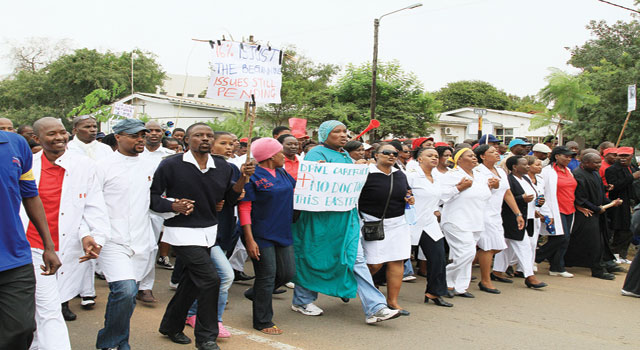Botswana’s public sector health care system stands at risk of being crippled entirely if nurses carry out their threat to down tools and not perform any non-nursing duties. After protracted negotiations with government collapsed, the Botswana Land Boards, Local Authorities and Health Workers Union (BLLAHWU) approached the High Court in July this year seeking an order barring nurses from performing non-nursing duties.
Earlier this year, BLLAHWU passed a resolution for its nursing cadres not to carry out any non-nursing duties like medical consultation of patients, prescription of drugs, ordering of laboratory specimen, ordering stock, compiling statistical reports, rationing of food to beneficiaries, registration of births and deaths as well as collection and safe keeping of revenue. The resolution also barred the Director of Public Service Management (DPSM) or any functionary of government from ordering nurses to perform such duties.
In papers filed before the courts, BLLAHWU secretary general Ketlhalefile Motshegwa said there was overwhelming evidence that nurses and mid wives employed in the public service particularly those employed at clinics and health posts were performing these duties as if they were entitled to do so. He listed a few nurses and midwives who testified that they were forced to perform non-nursing duties and would not refuse for fear of disciplinary action. BLLAHWU also included correspondence dating back to 2009, in which then permanent secretary in the Ministry of Health, Thato Raphaka confirmed that nurses were indeed performing duties that would otherwise be performed by medical practitioners. BLLAHWU also made reference to a report on migration of nurses, which disclosed that may nurses continue to leave Botswana because of heavy work load, poor working conditions high nurse-to-patient ratio.
“It cannot be seriously contended that it is in the public interest for nurses to continue performing non-nursing duties. This endangers patients and places nurses at risk of being sued,” said Motshegwa.
He added that nurses have been forced to carry out such duties even when there are medical practitioners and relevant personnel on station. Motshegwa also said the issue dates back to as far as 2008 when nurses reneged on a resolution to down tools after government promised to seek a solution as soon as possible. He said nurses resumed their duties in the interests of the nation, but were disappointed when government still sat on the issue. Government made another undertaking to address the matter in 2010 and subsequently set up a joint working committee with union representatives to interrogate the issue. A technical working team was set up in 2010 and later recommended that job descriptions of nurses at clinic and hospital levels should be reviewed, harmonized and graded to ensure consistency. However, Motshegwa said in his affidavit that the problem of non-nursing duties continues even today as the situation has not changed.
By January 2014, BLLAHWU wrote a letter demanding that government should issue a directive to the effect that nurses must stop performing non-nursing duties with immediate effect. Government failed to respond to BLLAHWU’s letter and the union has now approached the courts for redress.

